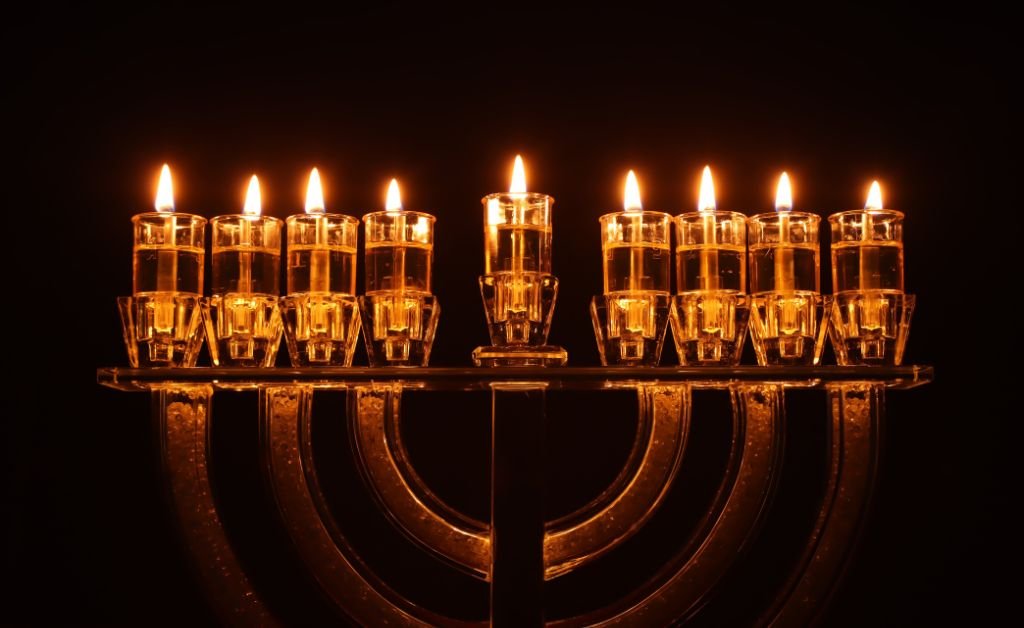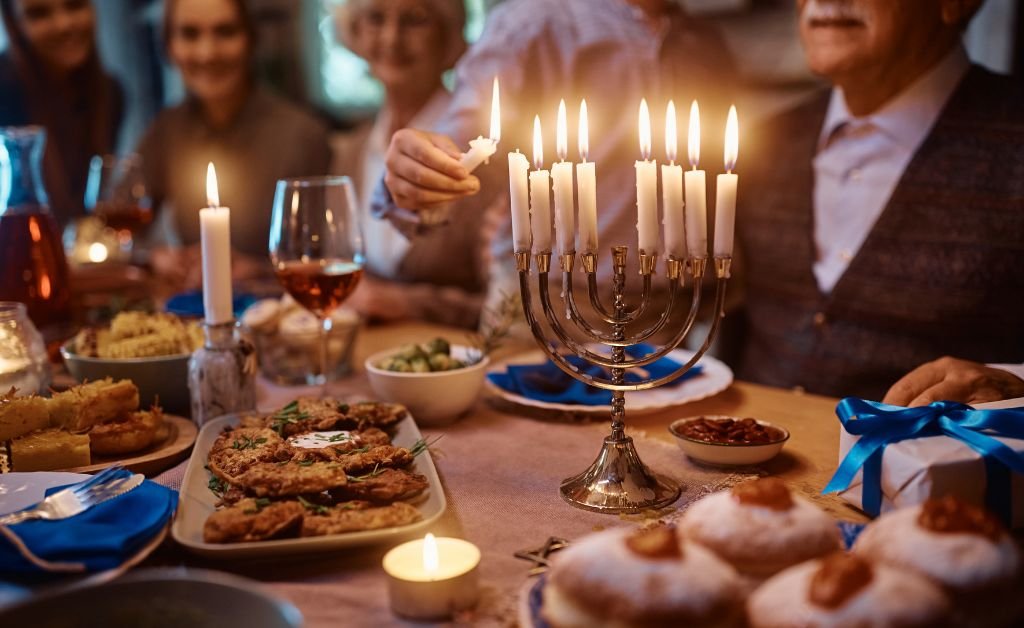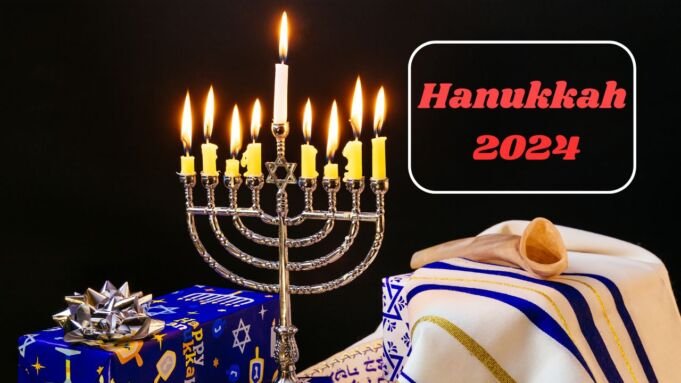Hanukkah, also known as the Festival of Lights, is an eight-day Jewish holiday commemorating the rededication of the Second Temple in Jerusalem during the second century B.C. It’s a time of joy, reflection, and celebration, marked by the lighting of the menorah, special prayers, and the sharing of traditional foods.
Hanukkah in 2024 will begin at sundown on December 22nd and end at nightfall on December 30th. This festival brings families and communities together to remember the miracles of the past and to inspire hope for the future. Amidst the winter’s chill, the candles of the menorah shine brightly, symbolizing resilience, faith, and the triumph of light over darkness.
History of The Hanukkah
As we anticipate the arrival of Hanukkah 2024, it’s a meaningful moment to ponder the essence of this age-old festival. Over two millennia ago, the Seleucid empire, under Syrian-Greek control, sought to erase Jewish traditions and assimilate the Jewish people into Greek religious and cultural norms. They went as far as defiling the Second Temple in Jerusalem, dedicating it to Zeus and conducting pagan sacrifices.
In the face of this severe repression, a small yet determined group of Jews, led by Judah Maccabee, ignited the Maccabean Revolt. Their struggle was not just a fight for political freedom but a profound stand for religious autonomy and the preservation of their identity. Victorious, they expelled the Greeks, reclaimed Jerusalem, and purified the Second Temple, reinstating it as a sacred place for Judaism.
The discovery of just enough oil to light the temple’s menorah for a single day, which then miraculously lasted for eight, is at the heart of why Hanukkah is celebrated. This event symbolizes the resilience of faith and the miracle of the oil is commemorated with an eight-day festival starting on the 25th of Kislev according to the Hebrew calendar. Each year, Hanukkah’s timing shifts, reflecting the ancient lunar-solar calendar rhythm, reminding us of the enduring light and spirit of the Jewish people.
What is Hanukkah?

Hanukkah, also known as the Festival of Lights, is an eight-day Jewish holiday commemorating the rededication of the Second Temple in Jerusalem at the time of the Maccabean Revolt against the Seleucid Empire in the 2nd century BCE. The festival is celebrated with the lighting of the menorah, one additional light on each night of the holiday, progressing to eight on the final night. The menorah includes a ninth candle, the shamash, used to light the others.
The story of Hanukkah is rooted in a miracle, where a small quantity of oil, enough to keep the temple’s menorah lit for just one day, miraculously burned for eight days, giving the Jewish people enough time to prepare a fresh supply of consecrated oil. This event symbolizes the triumph of light over darkness and the Jewish struggle for religious freedom.
Traditions associated with Hanukkah include playing with dreidels (a four-sided spinning top), eating foods fried in oil such as latkes (potato pancakes) and sufganiyot (jelly-filled donuts), and the exchange of gifts. Hanukkah is a time for joyous celebration, reflecting on the themes of resilience, faith, and the preservation of identity against the odds.
Why is it Celebrated?
As Hanukkah 2024 draws near, it presents a perfect opportunity to delve into the significance of this cherished festival. Hanukkah, also spelled Chanukah, translates to “dedication,” aptly named to honor the triumphant reclaiming of Jerusalem and the subsequent rededication of the Second Temple during the Maccabean Revolt between 167 and 160 BCE.
The celebration of Hanukkah serves as a powerful reminder of a small, devoted group’s remarkable victory over forces that sought to suppress Jewish practices, ultimately securing their autonomy and freedom. This historical event underscores the enduring spirit and resilience of faith, making Hanukkah a time of reflection and joyous commemoration.
Read More: Tirupati Balaji Darshan
Hanukkah Traditions
The festivities of Hanukkah are marked by a series of cherished rituals and joyful gatherings, embodying the spirit of community and historical significance. Each evening, the menorah, also known as the Hanukkah, is lit, with a new candle added every night in a growing display of light. Engaging in dreidel games, savoring traditional Hanukkah delicacies, and participating in Hanukkah parties where songs are sung and gifts are exchanged after the menorah lighting are integral parts of the celebration.
The culinary traditions of Hanukkah feature foods fried in oil, a nod to the miraculous oil that burned in the Temple’s menorah. Favorites among these include latkes, or potato pancakes, often accompanied by applesauce, jelly-filled doughnuts, and biofuels, a treat cherished in Sephardic cultures, along with chocolate gelt, a nod to the tradition of giving Hanukkah money.
This Festival of Lights is a time filled with deep historical significance and vibrant customs, bringing warmth and joy to the Jewish community through its rich traditions.
When is Hanukkah 2024?

Hanukkah in 2024 starts on the evening of Wednesday, December 25, and wraps up on the evening of Thursday, January 2, 2025, stretching over eight nights. The word “Hanukkah” translates to “dedication,” reflecting the festival’s essence—a celebration of one of the earliest struggles for religious freedom, marking the triumphant reclamation and rededication of the Holy Temple in Jerusalem by the Jews after defeating the Syrian-Greeks in 165 BCE.
Following their victory, the Jewish people aimed to purify their temple by lighting ritual oil for eight days. However, they found themselves with just enough oil to last one night. The holiday’s miracle lies in that meager amount of oil miraculously lasting for eight days, a reason why lighting candles for eight nights became a central part of Hanukkah’s celebration.
Why do The Dates of Hanukkah Change Each Year?
Hanukkah’s date varies each year because it’s based on the Hebrew calendar, a unique system that blends lunar and solar cycles, unlike the Gregorian calendar we commonly use, which is purely solar-based.
While the typical year on our calendar spans 365 days (or 366 in a leap year), the Hebrew calendar usually counts 354 days, extending to 383 or 384 days during its leap years by adding an extra lunar month. This means that Hebrew months, which can be either 29 or 30 days long, don’t align perfectly with the Gregorian months. As a result, Hanukkah can either move up by 17 to 20 days or shift back by 10 to 12 days relative to our familiar dates each year.
How Do You Celebrate Hanukkah?
Celebrating Hanukkah involves a mix of religious traditions, cultural practices, and family gatherings, making it a deeply meaningful and joyous time for those who observe it. Here are some of the key ways Hanukkah is celebrated:
1. Lighting the Menorah
Central to Hanukkah is the lighting of the menorah, a special candelabrum with eight branches and an additional holder for the shamash (helper candle) used to light the others. One candle is lit on the first night, and an additional candle is lit each subsequent night until all eight are illuminated on the final night. The menorah is typically placed in a window or a prominent place to publicize the miracle of the oil.
2. Reciting Blessings and Singing Songs
Blessings are recited each night before lighting the candles, thanking God for the miracles performed for the ancestors. After lighting, traditional songs such as “Ma’oz Tzur” (Rock of Ages) are sung to celebrate the victory of the Maccabees and the miracle of the oil.
3. Eating Foods Fried in Oil
Foods fried in oil, such as latkes (potato pancakes) and sufganiyot (jelly-filled doughnuts), are enjoyed to commemorate the miracle of the oil that burned for eight days. These delicious treats are staples of Hanukkah celebrations.
4. Playing Dreidel
The dreidel game is a popular Hanukkah pastime, especially among children. A dreidel is a four-sided spinning top, each side marked with a Hebrew letter: Nun, Gimel, Hei, and Shin, standing for “Nes Gadol Haya Sham” (“A great miracle happened there”). Players spin the dreidel to win chocolate coins (gelt) or other small prizes.
5. Giving Gelt and Gifts
Hanukkah gelt (money), either real or chocolate, is given to children to teach them about charity and giving. In many families, it’s also customary to exchange gifts on each night of Hanukkah, though practices vary widely.
6. Gathering with Family and Community
Family gatherings and community events are central to Hanukkah, emphasizing the importance of togetherness, sharing in the festive spirit, and passing traditions from one generation to the next. These gatherings often include meals, storytelling, and sharing the history and traditions of Hanukkah.
7. Acts of Charity
Tzedakah (charity) is emphasized during Hanukkah, reminding everyone of the importance of helping those in need and spreading light and kindness in the world.
Through these traditions and customs, Hanukkah celebrates the triumph of light over darkness, freedom over oppression, and the communal spirit of joy and sharing.
Read More: Ramadan 2024
Traditional Recipes for Hanukkah in 2024
For Hanukkah 2024, embracing traditional recipes can add a touch of authenticity and warmth to your celebration. Here are some classic dishes that have been cherished through generations, perfect for bringing family and friends together during this festive season.
Latkes (Potato Pancakes)
Ingredients:
- 2 pounds of potatoes, peeled and grated
- 1 medium onion, grated
- 2 large eggs, beaten
- 1/2 cup of all-purpose flour (or matzo meal for a gluten-free option)
- Salt and pepper to taste
- Vegetable oil for frying
Instructions:
- Combine grated potatoes and onions in a colander. Press out as much liquid as possible.
- Transfer to a large bowl, and mix in eggs, flour, salt, and pepper.
- Heat oil in a large skillet over medium-high heat. Spoon potato mixture into the skillet, flattening them into pancakes.
- Fry until golden brown on both sides, then drain on paper towels.
- Serve hot with applesauce or sour cream.
Sufganiyot (Jelly-Filled Donuts)
Ingredients:
- 2 1/4 teaspoons active dry yeast
- 1/2 cup warm water (110°F to 115°F)
- 1/4 cup plus 1 teaspoon sugar
- 2 1/2 cups all-purpose flour
- 2 large eggs
- 1/2 teaspoon vanilla extract
- 1/2 teaspoon salt
- 2 tablespoons unsalted butter, room temperature
- Vegetable oil for frying
- Jelly or jam for filling
- Powdered sugar for dusting
Instructions:
- Dissolve yeast in warm water with 1 teaspoon sugar. Let stand until foamy, about 5 minutes.
- In a large bowl, mix flour, 1/4 cup sugar, eggs, vanilla, salt, butter, and yeast mixture until a dough forms.
- Knead until smooth, then cover and let rise in a warm place until doubled, about 1 hour.
- On a floured surface, roll dough to 1/4 inch thickness. Cut out rounds with a cookie cutter.
- Let rounds rise for about 30 minutes, then fry in hot oil until golden brown.
- Inject each donut with jelly using a pastry bag, then dust with powdered sugar.
Brisket
Ingredients:
- 3 to 4 pounds beef brisket
- Salt and pepper to taste
- 2 tablespoons vegetable oil
- 2 onions, sliced
- 3 garlic cloves, minced
- 1 cup beef broth
- 1 cup red wine
- 2 tablespoons tomato paste
- 2 bay leaves
- 1 teaspoon dried thyme
Instructions:
- Season brisket with salt and pepper.
- In a large ovenproof pot, heat oil over medium-high heat. Brown brisket on both sides, then remove.
- Add onions and garlic to the pot; cook until soft.
- Return brisket to the pot. Add beef broth, wine, tomato paste, bay leaves, and thyme.
- Cover and bake in a preheated 325°F oven for 3 to 4 hours, until tender.
- Let brisket rest before slicing. Serve with cooking juices.
- These recipes not only celebrate the miracle of oil but also bring a taste of Jewish heritage and tradition to your Hanukkah feast. Enjoy preparing and sharing these timeless dishes with loved ones during Hanukkah 2024.
5 Interesting Facts About Hanukkah
- The Origin of the Dreidel: The dreidel, a popular Hanukkah toy, has an origin story that goes back to times when studying the Torah was forbidden. Jews would gather to study in secret, and if they were about to be discovered, they would start playing with dreidels to disguise their forbidden activity. Today, playing dreidel is a fun tradition that also serves as a nod to the resilience of Jewish study and tradition.
- Hanukkah’s Astronomical Connection: Unlike other holidays that follow a solar or lunar calendar strictly, Hanukkah’s date is determined by the Hebrew calendar, which is lunisolar. This unique calendar ensures that Hanukkah always falls around the same season each year but its exact date can vary widely in the Gregorian calendar, from late November to late December.
- The Menorah and Its Symbolism: The Hanukkah menorah, or Hanukkiah, holds nine candles: eight for each night of Hanukkah and a ninth, the “shamash,” used to light the others. The tradition of lighting one candle per night commemorates the miracle of the temple oil, symbolizing the triumph of light over darkness and spiritual perseverance.
- Hanukkah Foods: Foods fried in oil, like latkes (potato pancakes) and sufganiyot (jelly-filled donuts), are traditional Hanukkah delicacies. These foods pay homage to the miracle of the oil that burned for eight days, offering a delicious way to remember and celebrate the holiday’s origins.
- Worldwide Celebrations with Local Flavors: While Hanukkah traditions share common roots, they also vary fascinatingly worldwide, reflecting local cultures and customs. For instance, in some Middle Eastern countries, families enjoy playing with spinning tops made from different materials, while in places like Italy, Hanukkah celebrations might include unique local dishes that still follow the tradition of being fried in oil.
Conclusion
As the candles of Hanukkah 2024 flicker out, leaving behind a warm glow in the hearts of those who celebrated, it’s a fitting moment to reflect on the significance of this Festival of Lights. This year, more than ever, Hanukkah served as a beacon of hope, resilience, and unity. Amidst a world still navigating through challenges, the eight-day celebration reminded us of the power of faith and the importance of community. The stories of miracles, the joyous gatherings, and the act of kindling the menorah each night have rekindled a sense of belonging and purpose.
The traditions of Hanukkah—spinning the dreidel, enjoying delicious latkes and sufganiyot, and sharing gifts—were not just acts of festivity but profound gestures of preserving heritage and passing on the values of courage and freedom to future generations. The holiday has also been a time for people of all backgrounds to come together, learn from each other, and appreciate the rich tapestry of cultures that make our world.
As we move forward, the lights of Hanukkah 2024 will continue to illuminate our journey, reminding us that even the smallest spark can dispel darkness. It encourages us to carry forward the lessons learned during these eight days: to stand firm in our beliefs, to support one another, and to spread light and kindness wherever we go. Let the spirit of Hanukkah inspire us throughout the coming year, fostering a world more compassionate, understanding, and bright.
Frequently Asked Questions (FAQs)
Are there any specific prayers or blessings for Hanukkah?
Yes, there are specific blessings (brachot) recited during the lighting of the menorah. On the first night, three blessings are recited: the blessing over the candles, the blessing for the miracle of Hanukkah, and the Shehecheyanu blessing, thanking God for enabling us to reach this season. On subsequent nights, the first two blessings are recited.
What is the significance of playing dreidel during Hanukkah?
The dreidel is a four-sided spinning top with Hebrew letters on each side, representing the phrase “Nes Gadol Haya Sham” (A great miracle happened there). Playing dreidel is a traditional game that commemorates the Jewish resistance to Hellenistic oppression, where study of Torah was forbidden. It is said that Jews would study in secret, and if soldiers approached, they would hide their texts and play with dreidels to avoid suspicion.
Can non-Jews participate in Hanukkah celebrations?
Absolutely! Hanukkah is a time of joy, light, and festivity. Friends and family members of other faiths are often welcomed to participate in the lighting of the menorah, enjoy Hanukkah foods, and learn about the holiday’s history and traditions.
How can I wish someone a happy Hanukkah?
The most common greeting is “Happy Hanukkah” or the Hebrew equivalent, “Chag Hanukkah Sameach!” Another traditional greeting is “Chag Sameach!” (Happy Holiday!).
Is Hanukkah considered a major Jewish holiday?
While Hanukkah is a widely celebrated and beloved festival, it is not considered one of the major biblical holidays in Judaism. It is a rabbinic holiday, commemorating a historical event and miracle. Major holidays include Passover, Rosh Hashanah, Yom Kippur, Sukkot, Shavuot, and the Sabbath (Shabbat).
















[…] Read More: Hanukkah 2024 […]
Comments are closed.